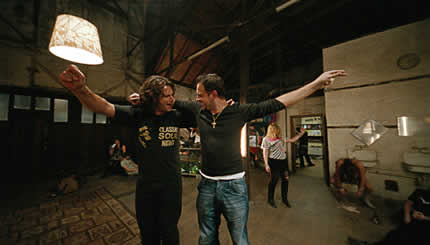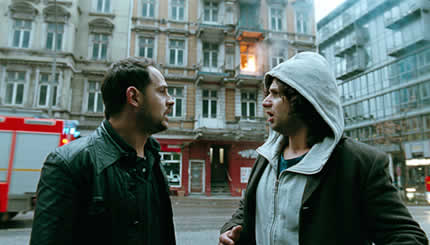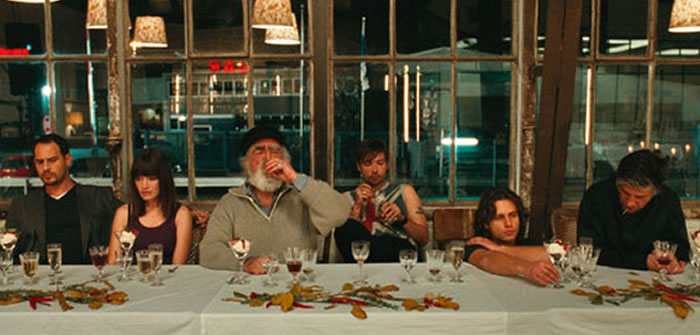Soul Kitchen is the story of a young restaurant owner Zinos is down on his luck. His girlfriend Nadine has moved to Shanghai, his Soul Kitchen customers are boycotting the new gourmet chef, and he‘s having back trouble! Things start looking up when the hip crowd embraces his revamped culinary concept, but that doesn’t mend Zinos’ broken heart. He decides to fly to China for Nadine, leaving the restaurant in the hands of his unreliable ex-con brother Illias. Both decisions turn out disastrous: Illias gambles away the restaurant to a shady real estate agent and Nadine has found a new lover! But brothers Zinos and Illias might still have one last chance to get Soul Kitchen back if they can stop arguing and work together as a team.
Fatih Akin, director of Soul Kitchen was born in 1973 in Hamburg of Turkish parentage. While studying Visual Communications at Hamburg’s College of Fine Arts, he wrote and directed his first short in 1995: Sensin – You’re the One!, which received the Audience Award at the Hamburg International Short Film Festival, followed by Weed in 1996. His first feature, Short Sharp Shock (1998), won Locarno’s Bronze Leopard and the Bavarian Film Award for Best Young Director. Fatih’s other film are The Edge of Heaven and Crossing the Brigde – The Sound of Istanbul.
Bijan Tehrani: How did you come up with the idea of making Soul Kitchen?
Fatih Akin: This script is a very old script of mine. I wrote the first draft of this script after the editing of Head On which took place during the fall of 2003. I was broke at the time because I was one of the producers on that film. So I had this naïv idea that I would write something that would be very sad and I would use my friends and the people in my neighborhood. One of the main actors in my film had his girlfriend leave him and I used that for the basis of the film. I wrote the first five pages of the script five days after his girlfriend had left him. I won the Golden Bear in February of 2004 and then I quit the project. I felt a huge amount of pressure due to the success of Soul Kitchen and decided that I would control my success and try to make something similar for the market. But the story stayed in my head and I would constantly rewrite the script and make corrections. I hoped that even if I did not make the movie myself, I would shop it to other directors and maybe I would just stay on as producer. I could not find the right director. During the last week of shooting the Edge of Heaven a good friend of mine died, and this really affected me. He always wanted me to do Soul Kitchen and he was always very supportive of the project. I grieved over his death for a very long time and I decided that I would do Soul Kitchen as a way to relieve my pain.
of the producers on that film. So I had this naïv idea that I would write something that would be very sad and I would use my friends and the people in my neighborhood. One of the main actors in my film had his girlfriend leave him and I used that for the basis of the film. I wrote the first five pages of the script five days after his girlfriend had left him. I won the Golden Bear in February of 2004 and then I quit the project. I felt a huge amount of pressure due to the success of Soul Kitchen and decided that I would control my success and try to make something similar for the market. But the story stayed in my head and I would constantly rewrite the script and make corrections. I hoped that even if I did not make the movie myself, I would shop it to other directors and maybe I would just stay on as producer. I could not find the right director. During the last week of shooting the Edge of Heaven a good friend of mine died, and this really affected me. He always wanted me to do Soul Kitchen and he was always very supportive of the project. I grieved over his death for a very long time and I decided that I would do Soul Kitchen as a way to relieve my pain.
BT: The interesting thing about Soul Kitchen is that it is very much like life and it takes you through unexpected turns. How did you go about writing the screenplay?
FA: I wrote the screenplay along with Adam Bousdoukos who is also an actor in the film. He had a restaurant for ten years, so he knew a lot of stories and anecdotes and he know about a lot of the issues of dealing with customers in a restaurant. We would have these jam sessions and in the evenings I would go home and write them down on paper. The other day I was reading some of the stuff  that I had written and I realized that it took me years to write some of this stuff. We always wanted to put pressure on the heroes. We pictured the heroes as mice running in a wheel. The story is the wheel, which just goes on and on, but the hero cannot get out. We watched a lot of comedies while writing the script. We saw some of the stuff that we liked and also some of the stuff that we did not like. We got introduced to the films of Chaplin and we learned a lot about visual humor that is present in silent films. We analyzed a lot of Jewish humor, such as the work of the Coen Brothers. The whole film is about the love of cinema, and you can clearly see us two cinema lovers sampling everything we like and bringing it together.
that I had written and I realized that it took me years to write some of this stuff. We always wanted to put pressure on the heroes. We pictured the heroes as mice running in a wheel. The story is the wheel, which just goes on and on, but the hero cannot get out. We watched a lot of comedies while writing the script. We saw some of the stuff that we liked and also some of the stuff that we did not like. We got introduced to the films of Chaplin and we learned a lot about visual humor that is present in silent films. We analyzed a lot of Jewish humor, such as the work of the Coen Brothers. The whole film is about the love of cinema, and you can clearly see us two cinema lovers sampling everything we like and bringing it together.
BT: There seems to be a lot of different influences from many different cultures in the film. Was this done intentionally?
FA: Well, that is really my world. I am a very personal filmmaker, so the things you see in my films come directly from my world. The original restaurant existed for ten years and was a home for so many people from all over the world. You saw girls from the Middle East, the Falklands, etc. The place was really a harbor for people from all over the world; somehow New York is the mother of all of the cities. I am an artist and I do not have borders, so I don’t care about any of that and the fact that I don’t care is expressed in the film.
BT: The film has such a wonderful soundtrack— so much to the point that you can even close your eyes and enjoy the film. How did you come up with these music choices?
FA: It’s not that this is a film with my favorite music; I have a very rich musical horizon. I listen to a lot of different stuff. We wanted to do a song about our hometown, Hamburg. The sound of Hamburg is so musically orientated mainly because the area was filled with many British and American soldiers before the wall came down. There is much more soul in Hamburg than there is Berlin. There are many mixed children with American fathers and German mothers. There were two turntables in the restaurant, so we would just listen to a lot of music and we knew about the emotional map and it helped us so much when it came to making the film. The decisions that I had for the soundtrack would be like a good DJ’s test. The whole film seemed like a wild DJ set and the music fit so well into the film.
BT: How did you come up with the visual style of the film?
FA: I almost did not do the film with my DP and it would have been the worst thing I would have done. I was not satisfied with Edge of Heaven— not so much with the visual style, but mainly because my producer was dying and so I did not have a good experience making the film. After that experience I wanted to do something totally different and decided that I wanted to work with completely different people, but he insisted that he wanted to do the film with me. I kind of argued with him, but he insisted that he would make the film the way I wanted to make it and I agreed. He turned out to be like an uncle to me on the set because he was nearly the oldest crew member. He was always the guy who I could listen to, and he really protected me during the confusion of the filmmaking. It confirmed that I would continue my work with him.

